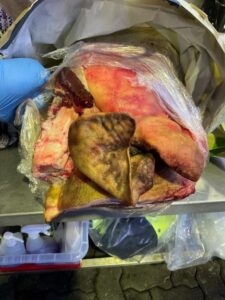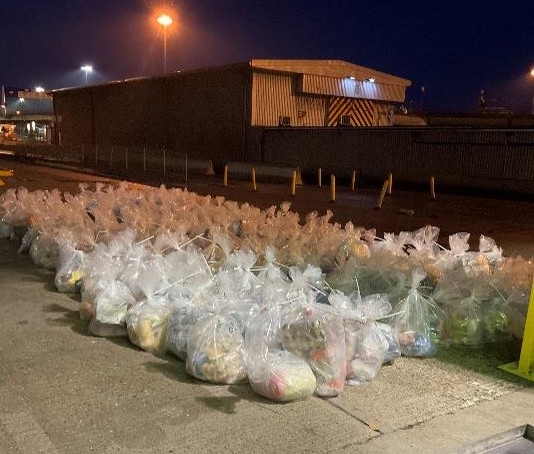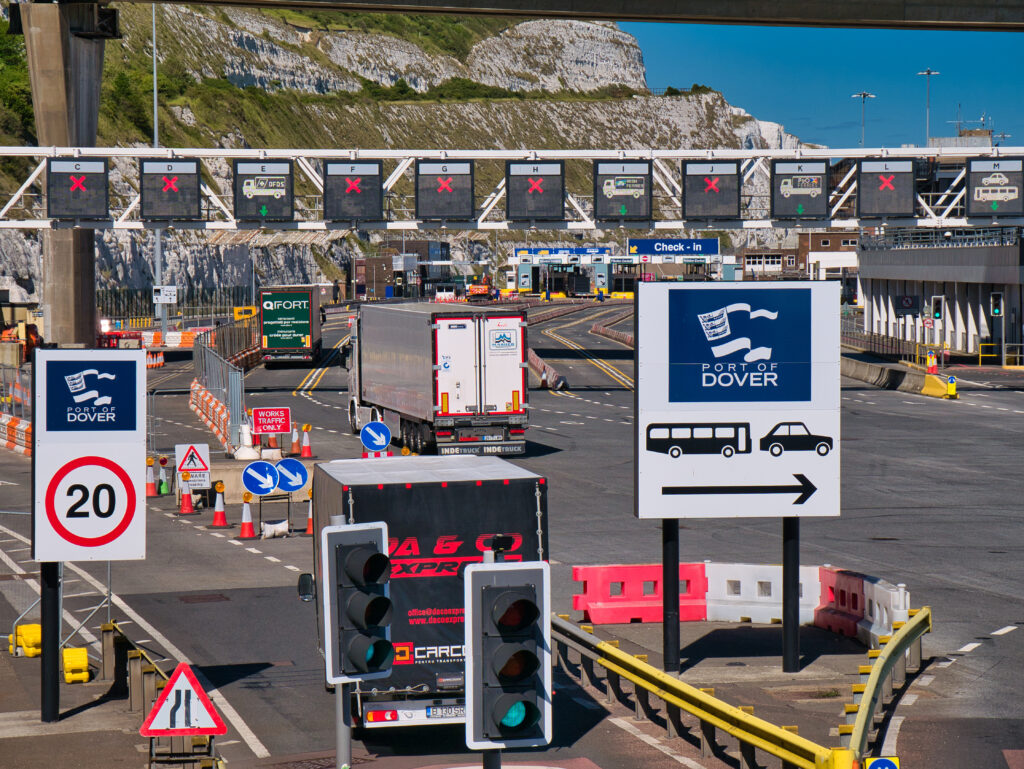Defra is planning to slash funding for vital work in seizing illegal meat imports at the Port of Dover, in a move officials within Dover Council have warned could have disastrous consequences for the UK pig sector.
Dover Port Health Authority (DPHA) and the Council are urging the Department to reconsider a proposed 70% cut to this budget, and also a separate proposal to transfer official import checks 22 miles inland to near Ashford when the Government’s Border Target Operating Model (BTOM) comes into full effect at the end of April.
The team at DPHA, working with UK Border Force, seized 1.1 tonnes of illegally imported meat at Dover in just a few hours on Saturday, alone, highlighting the scale and importance of this work, undertaken specifically to keep African swine fever (ASF) out of the country.
Since Defra introduced new rules in September 2022 making it illegal to bring pork and pork products over 2kg into GB, unless produced to the EU’s commercial standards, DPHA and Border Force have seized 57 tonnes of meat products, often bought in in very large quantities.
This has been described as just the ‘tip of the iceberg’, with significantly greater volumes getting through undetected, prompting calls from DPHA, the NPA and others for Defra to put more resource into the activity, given the potentially devastating impact of an ASF outbreak.

 DPHA is also being asked to extend this work to Coquelles, where the Channel Tunnel starts in France, which it has identified as a key risk point for the illegal meat trade.
DPHA is also being asked to extend this work to Coquelles, where the Channel Tunnel starts in France, which it has identified as a key risk point for the illegal meat trade.
However, just before Christmas, Defra announced it would be cutting the funding provided to police the ASF measures by as much as 70%, Lucy Manzano, head of port health & public protection at Dover District Council, told Pig World.
“So, they want us to do twice the work in two different locations, with Coquelles presenting far more significant challenges, with a reduced budget,” she said.
Budget
It is understood that the work was being funded out of a budget initially allocated to the much-delayed BTOM. But when it starts operating in from the end of this month, with full customs checks starting in late-April, budgets will be squeezed.
DPHA currently employs around 40 people, but not all are employed on the ASF checks, which take place during certain periods within the day. “We don’t have enough resources now to provide the number of people needed on the ground to cover a 24-hour period, so there are gaps and that’s why we have called for greater resources,” Ms Manzano said.
She explained how the scale of the illegal trade in pork and a whole range of other Products of Animal Origin (POAO) through Dover has shocked everyone since the work start in September 2022.
“With very minimal resource, we have found significant amounts – we are talking mega numbers,” Ms Manzano said.
“It is coming over in vans and even coaches with no passengers and a trailer full of POAO. It is often presented horrendously, with vehicles dripping with blood and leaving a trail behind them. We are doing it in lanes at Dover, with a huge cross contamination risk and very limited facilities for washing down.”

She said the illegal trade, which brings a huge risk to the UK pig sector, is happening ‘in plain sight’, with those bringing it in facing no sanctions, other than the seizure of the meat, if caught. “It is very much pot-luck and resource as to whether these goods are pulled over. They see it as a risk worth taking,” she added.
She warned that cutting funding by 70% would make it virtually impossible to continue this work in its current form. “It would potentially result in redundancies, and we would have to rotate small teams between Dover and Coquelles over a very small window, so it would be ineffective,” she said.
“We are really aware that this is a critical risk to UK biosecurity, our farming industry and our pig stocks. It would be catastrophic in terms of export bans, culling and reputational damage, and we are shocked that, rather put more robust controls in place, Government is proposing a 70% cut. This is the pinch point for this trade.”
She said the council has asked the Government to explain and justify the cut, but is yet to have ‘meaningful engagement’ with Department on it.
Import checks
The council is equally angry at the proposal to move the Border Control Post (BCP), which will be utilised when physical Sanitary and Phytosanitary (SPS) checks of goods are implemented under the BTOM from the end April, from Bastion Point, at Dover, to an inland site at Sevington, near Ashford, 22 miles away.
Defra said Sevington would provide, ‘on one modern and purpose-built site, checks on the whole range of goods and live animals that arrive through both the Port of Dover and Eurotunnel’ and was ‘ideally located to support the smooth flow of goods out of both points of entry without disrupting traffic flows out of the Port of Dover’.
These checks, generally of commercial goods, will be separate to the ASF illegal meat seizures at Dover, but, according to Ms Manzano, will be key to maintaining UK biosecurity and food safety and protecting farmers across a range of products.
There is a smaller BCP at Dover and Ms Manzano said the move would require vehicles to travel 22 miles across Kent, presenting unacceptable biosecurity risks, but also compromising compliance, as drivers will be under no obligation to go to Sevington, if asked to do so.
“Controls are needed at point of entry. That is a basic principle of border control. Instead vehicles are being asked to drive, in many cases right past the Dover BPC, to a location further away than France,” she said
“The decision is based on an infrastructure outcome, which we believe is not in the best interests of UK biosecurity and we cannot support it.
“It is imperative that there is some scrutiny over what is being proposed at the short straits and we will continue to challenge these two decisions.”
Defra response
Responding to a question about funding for the ASF work at Dover from Pig World at the Oxford Farming Conference, Farming Minister Mark Spencer did not respond directly.
He said there was ‘a role here for education to make sure that tourists and UK consumers don’t accidentally bring something in’. “Of course, we need to work with border force to ensure we are stopping those illegal imports,” he said.
Defra also refused to respond directly to a query about the proposed Dover funding cuts. It stressed that the ASF safeguard checks will be conducted with Border Force at the point of entry, Dover Port, and that it has never been the intention to move this work to Sevington.
A Government spokesperson said: “We remain committed to delivering the best border in the world. The Border Target Operating Model is key to delivering this, protecting the UK’s biosecurity, and ensuring our trading partners have confidence in our exports.
“The new model will see a significant reduction in the number of checks required at Border Control Posts (BCPs). We therefore intend that all Sanitary and Phytosanitary (SPS) checks for goods moving across the short straits should be undertaken at the Sevington Inland BCP. This will ensure our high biosecurity standards are maintained, whilst also reducing operating costs and burdens on traders.”
After consideration, it concluded that two sites were not necessary to service the volume of checks anticipated and would cost an additional £7 million per year.
Catastrophic
 NPA chief executive Lizzie Wilson said cutting the budget for the ASF work at Dover could be ‘catastrophic’ for the pig sector, which would be left exposed to a potentially devastating outbreak of ASF.
NPA chief executive Lizzie Wilson said cutting the budget for the ASF work at Dover could be ‘catastrophic’ for the pig sector, which would be left exposed to a potentially devastating outbreak of ASF.
“DPHA, along with Border Force, have been doing fantastic and incredibly difficult work since the introduction of the ASF measures in September 2022, exposing the huge scale of the illegal activity taking place, often significant organised food fraud, and the reality that what is being seized is just the tip of the iceberg.
“This makes it absolutely imperative that, rather than slashing funding, more resources are made available for this absolutely critical work, especially as there is currently no detail on the personal imports checks will supposedly serve as a replacement.
“Mitigating the risk of incursion of all notifiable diseases starts with prevention. What government is proposing will essentially create an opening in our borders which didn’t previously exist.”




